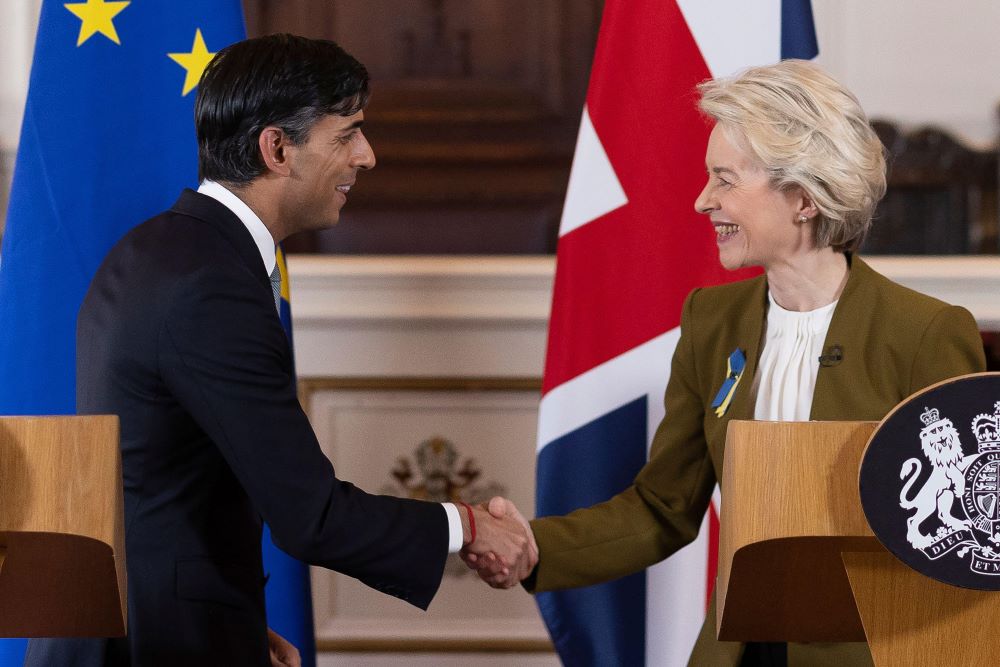How The Northern Ireland Protocol Deal Will Work And The Big Questions That Remain
Prime Minister Rishi Sunak and European Commission President Ursula von der Leyen in Windsor (Alamy)
6 min read
The UK and European Union have finally agreed a deal on resolving the Northern Ireland Protocol, dubbed the 'Windsor Framework'.
On Monday, Prime Minister Rishi Sunak and European Commission President Ursula von der Leyen met in Windsor where they added their signatures to a new pact.
Sunak hailed the deal as a "turning point" for Northern Ireland that would tackle the practical problems that have arisen in the region since post-Brexit arrangements came into effect there.
The original protocol, agreed as part of Brexit divorce talks, was designed to avoid a contentious hard border on the island of Ireland. It did so, however, by creating new barriers to trade in the Irish Sea, which the Democratic Unionist Party (DUP) say undermine Northern Ireland's place in the UK.
The DUP, led by Sir Jeffrey Donaldson, collapsed Stormont's power-sharing government early last year over its opposition to the treaty, which came into effect at the beginning of 2022, prompting London and Brussels to spend many months negotiating a revised version.
Sunak has achieved what his Downing Street predecessors Boris Johnson and Liz Truss did not in reaching a deal with the EU, marking a major achievement for the Prime Minister.
Political challenges await the PM, however, as the DUP is yet to decide whether to back the deal, and staunchly pro-Brexit Conservative MPs comb through the details.
In the meantime, here are the major changes brought about by the Windsor Framework.
Lots of checks removed
Once implemented, this new treaty will significantly reduce the number of border checks on goods crossing the Irish Sea from Great Britain to Northern Ireland.
Previously, GB goods heading across the water were regarded as at risk of going onto the Republic of Ireland, which is an EU member, and potentially a threat the integrity of the bloc's Single Market. To mitigate that perceived risk, a range of checks have been carried out on them.
However, a new "green lane" will be created in which very few checks will take place, with customs controls only applied when there are suspicions of smuggling. This lane will be for businesses sending goods from Great Britain to Northern Ireland. There will be a "red lane" for goods heading from Great Britain to the Republic of Ireland and therefore the EU, in which normal EU paperwork will apply.
The sausage war is over
The deal announced on Monday will see controversial barriers removed from a number of items.
A ban on sausages and other chilled meats produced in Great Britain being sold in Northern Ireland shops, brought about by the original protocol, will fall away.
It will mean if food "is available on supermarket shelves in Great Britain, then it will be available in supermarket shelves in Northern Ireland," Sunak declared yesterday.
A similar ban on seed potatoes and trees will also be scrapped.

Poodles, pints and parcels
People who want to take their pets across the Irish Sea will no longer have to secure EU documentation to do so.
Under the original Northern Ireland Protocol, pet owners taking their animals from Great Britain to Northern Ireland were required to provide health certification and proof of recent vaccination.
Those rules will no longer apply under the Windsor Framework.
The UK will also have the ability set to VAT rates for alcohol sold in Northern Ireland for immediate consumption, whereas the original protocol handed that responsibility to Brussels.
Parcels sent from Great Britain to recipients in Northern Ireland will longer face burdensome customs regulations, and barriers to medicine crossing the Irish Sea will also be removed.
Taken together, this agreement by the UK and EU to massively reduce trade barriers to a range of everyday items has been welcomed by the DUP, whose approval is key to the success of the Windsor framework, as well as other Northern Irish parties and the region's business community.
Now for the trickier part...
The 'Stormont Brake'
The thorniest issues in this saga have been sovereignty and the question of the role of the European Court of Justice (ECJ) in overseeing Northern Ireland's post-Brexit arrangements.
Under the original protocol, new or updated EU laws apply automatically in Northern Ireland, by virtue of the region following the bloc's rules, without politicians in Stormont having a say.
Sunak described this as a "democratic deficit", while the DUP said it would not back any deal which didn't address this fundamental problem.
This is where the Stormont Brake comes in.
Seen as the UK's biggest win in the talks, it effectively gives the Northern Irish Assembly the ability to veto a new or updated EU law being applied to Northern Ireland.

How will the 'Stormont Brake' work?
It is based on a mechanism contained within the 1998 Good Friday Agreement peace deal called the Petition of Concern.
If 30 or more members of the Northern Irish Assembly (MLAs) from two or more political parties sign a petition saying they oppose the introduction of a new or updated EU rule in Northern Ireland, then the UK government will notify the EU and the rule in question will automatically cease to apply.
If a dispute between the EU and UK arises over a use of this mechanism, then an independent arbitator – not the ECJ – would settle it.
The government described the mechanism as handing Stormont a "genuine and powerful role".
But there are concerns...
The Windsor Framework says the Stormont Brake cannot be used for "trivial" reasons and that those using it must be able to demonstrate how the rule in question will cause significant and lasting disruption to life in Northern Ireland.
There are questions over exactly how this threshold will be determined, and concern within the DUP that the bar will be so high that it will be very difficult for to use.
This concern has been triggered by the EU's insistence that the mechanism would only be used in "the most exceptional circumstances and as a matter of last resort".
Other political parties in Northern Ireland are worried that the mechanism effectively amounts to a unionist veto that the DUP could use frequently and to a disruptive effect.
There are 90 members of the Assembly, 25 of whom are in the DUP. That means the party would need the support of just five more MLAs to launch a Petition of Concern.
A potentially clever move
Crucially, the Stormont Brake can only be used when Stormont is sitting. Putting it simply, MLAs can only sign a Petition of Concern when they are actually in the Assembly.
The government will hope that this will further persuade the DUP to get back into power sharing with the region's largest party, Sinn Fein, following the announcement of this agreement.
Donaldson said on Monday that his party will go away and closely study the text of the Windsor Framework before deciding its position.
